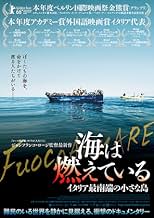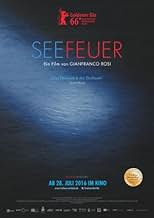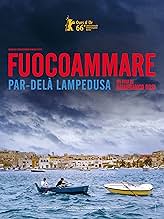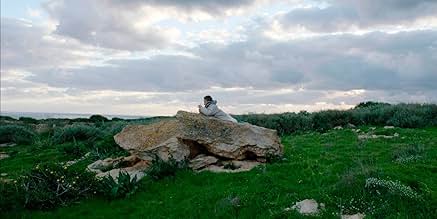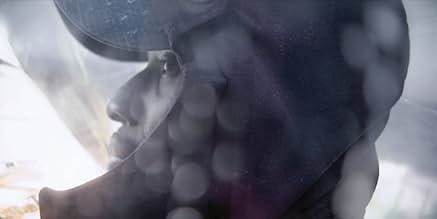Adicionar um enredo no seu idiomaCapturing life on the Italian island of Lampedusa, a frontline in the European migrant crisis.Capturing life on the Italian island of Lampedusa, a frontline in the European migrant crisis.Capturing life on the Italian island of Lampedusa, a frontline in the European migrant crisis.
- Direção
- Roteiristas
- Artistas
- Indicado a 1 Oscar
- 16 vitórias e 28 indicações no total
- Direção
- Roteiristas
- Elenco e equipe completos
- Produção, bilheteria e muito mais no IMDbPro
Avaliações em destaque
And yet, that's exactly what director Gianfranco Rosi has tried to do in this documentary. He must have spent many months with the Italian coast guard, which tracks down the vessels with refugees. And he must have shot an immense quantity of footage, because it's clear he has selected only the best material.
The film doesn't explain or elaborate. It just shows, as a good movie is supposed to do. There is some very shocking footage, but also plenty of small, almost ordinary scenes like a beautiful shot of a helicopter taking off, or a doctor doing a check-up of a newly arrived refugee pregnant with twins.
But there are not only scenes of refugees. There is also daily life on the island, which we see through the eyes of a small boy. The contrast between the calm, uneventful lives of the boy and his family, and the utter despair and misery of the refugees, is what makes this film special. It also offers the viewer some relief from the grim scenes at sea. Some of the scenes featuring the boy are really funny, such as his visit to the doctor because of an imagined illness.
The editing of the film is great. There is a slow build-up, with scenes whose meaning is not immediately clear. But later on, things fall into place. The most shocking footage is shown near the end. Also, there is a very good balance between the rescue scenes at sea and almost poetic scenes of daily life on the island.
So the common thing in the film is the Sea that divides the two continents, Europe and Africa. This film sets around that region about the people who depended on it for the living, growing up and looking for the fresh life start. But the majority of those who saw it recognise only the refugees who cross the sea. That's wrong to label this film is about the refugees. Around 20-25 per cent of the film concentrated on that issue. Only about their struggle on their journey to the other side, but it reveals nothing on its root cause. If you ask me, I would say only one religion making all this mess in the middle-east, otherwise you won't see the western army in that region.
Some of the clips, the real ones are really disturbing. I won't blame those people who took such risk to get the other side of the sea. Believe me, I'm not a nationalist, so I won't believe in borders and regions that divided over language and ethnicity base. But I do mind the religious. If that was eradicated from the earth's surface, particularly one that's causing all the trouble immediately, we can co-exist peacefully. That's the major issue here, but we're after temporary solution. The film does not say all this, but you will get the clear picture.
"The ships fired rockets and at sea. It was like there was fire at sea."
For me this was an average film. I have seen the much better documentaries than this on various issues of the world. The filmmakers don't want to take sides, so they only revealed the truth by just following and making videos of life in and around the Mediterranean Sea. Like I meantioned earlier, some of the angles do not make any sense or difficult to understand its purpose. I don't know the others, but I have got plenty of questions about the film to ask the filmmakers. If you are like me, welcome aboard.
It was the Italian entry for the 2017 Oscars and it did not make, but found a slot in the list of Best Documentary Feature. This is the first out of five from that category I have seen, so I don't know whether it wins the award or not, but as per the prediction made by film fanatics and critics, this is the frontrunner.
Whatever the result would be, I'm not recommending it particularly the common people. Because the film fails to narrate the story which is very essential from the average peoples' perspective to get the message clear and loud. All one can get with this is only the outline on the very important issue at the moment. Remember how the David Attenborough's narration made to reach all the corners of the earth. Confusing over the purpose of the documentary, possibly misleading. Its like watching a news channel on the mute mode. Otherwise, this should have been one of the best of its kind.
5/10
Documentary films can be known for have a harsh look given his nature of realism and objectivity, the visual element becomes secondary when it's Reality the substance of the discourse in the movie, and also having in mind the idea of the political possibilities that this tool offers is normal to think that aesthetics are not really relevant.
In this case, Fire at Sea achieves the perfect balance between both elements: Political statement or position from a very Objective point of view; and very beautiful visual development without affect to much the reality of happenings. We are talking about a spellbinding but bittersweet piece of work that it can really shock you both painfully and delightedly, it's captivating but thrilling at the same time a really must see feature.
The style of this film is cinema-vérité, simply observing the various subjects in a very quiet way. Most of the attention is given to the island residents, particularly a twelve-year old boy. In the beginning, there are occasional feelings of boredom but once getting used to the meditative style, the movie is quite rewarding.
At first, one might wonder why there is less attention on the migrants but this eventually becomes understandable. If they had been the main subject, it is possible the viewer would feel overwhelmed and numb by the end. The smaller number of scenes end up having a greater impact. While not always horrific, the viewer sees up close the people behind the headlines - the migrants as well as the rescuers. Emotions run high before the viewer is bought back to daily routine life on the island which seems very distant from the lives of the migrants.
Director Gianfranco Rosi is very wise in avoiding any methods to heighten the real-life drama. The approach as a simple witness works perfectly especially in some highlighted scenes: the despair of a local doctor who is distressed by the plight of so many; a Nigerian refugee recounting the plight of his former country and finding more trouble in Libya as he and others traveled north; and of course, the indescribable feelings of seeing a large boat with hundreds of people cramped in it.
I felt right at the start that this is going to be great. The colors, the photography, the sound, everything lead to show me the harmony and the inner glow of Lampedusa and it's inhabitants, and the pragmatic, dramatic contrast of the migrants.
So much Charm. Wow! This movie is relaxes, shows drama in other ways...
Usually I don't even like slow films: with few cuts, few actions: But that one...blow me away.
It's like living there, essentially with them, feeling their emotions, the salty sea air on our skin... And I think this is mainly because of the "local actors". Rossi and the Cast made a ,,capolavoro" capturing and playing their life that way.
Congratulations!
Você sabia?
- CuriosidadesDirector Gianfranco Rosi did his own cinematography again, but used for the first time an ARRI Amira camera, which he said allowed him to shoot in dark environments: "Sometimes it looked like we had an incredible amount of light. Technology helped me a lot on this film. Being able to work with this tiny camera by myself was an incredible tool." [2016]
- Citações
Nigerian Refugee: This is my testimony... We could no longer stay in Nigeria. Many were dying. Most were bombed... We flee from Nigeria. We ran to the desert. We went Sahara Desert and many died... Raping and killing many people, and we could not stay. We flee to Libya. And Libya was a city of ISIS. And Libya was a place not to stay... On the journey on the sea, 200 passengers died. They got lost to the sea. A boat was carrying 90 passengers. Only 30 were rescued, and the rest died. Today we are alive...
Principais escolhas
- How long is Fire at Sea?Fornecido pela Alexa
Detalhes
Bilheteria
- Faturamento bruto nos EUA e Canadá
- US$ 120.933
- Faturamento bruto mundial
- US$ 1.178.377
- Tempo de duração
- 1 h 54 min(114 min)
- Cor
- Mixagem de som
- Proporção
- 1.85 : 1

![Assistir a Trailer [OV]](https://m.media-amazon.com/images/M/MV5BNmQ3ZjU0NzktZWFmNi00YzMxLTg1N2UtMGM3ZTgwMDU3OWJlXkEyXkFqcGdeQXRodW1ibmFpbC1pbml0aWFsaXplcg@@._V1_QL75_UX500_CR0)


